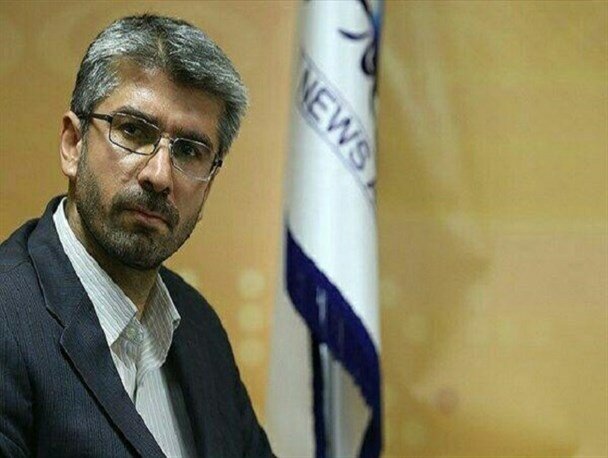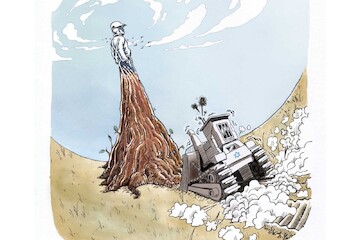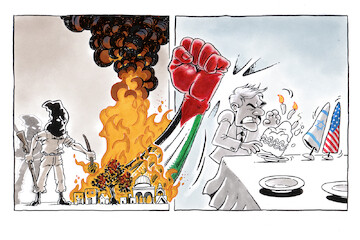Question: About two months ago, the media outlets of the Zionist regime, such as the official radio of this regime and the Maariv newspaper, acknowledged an increase in reverse migration from the occupied territories to European countries. How do you see the trend of reverse migration from these lands in recent years, and, in your opinion, what direction will this trend lead to in the future amid the unstable internal conditions of the Zionist regime?
S. Razavi: One of the most important and fundamental issues for the Zionist regime that is considered a security threat is the issue of population. In fact, since the occupation of Palestine and the creation of a land to form the fake government, the issue of population and the arrival of Jews from all over the world to this land has become a vital issue. Despite the natural growth of their population, the Jews could not compete with the original inhabitants of the occupied lands, the Palestinians, whose population growth was remarkable. As a result, one of the most important measures of the Zionist regime’s administrations was to bring in people from all over the world. Of course, even before the establishment of the Zionist regime, the Jewish Agency for Israel and many religious and Zionist Jewish leaders used to do this. The first wave of immigration occurred about 140 years ago, starting from the 1880s when a population in the form of Lovers of Zion entered occupied Palestine from Russia. This goes back to before the activities of Theodor Herzl. After Herzl somehow became the main figure in this affair, other organized Zionist organizations also entered this arena. Also in recent years, it seems that one of the efforts of the Zionist regime has been to establish a ministry called the Ministry of Immigration and Absorption, meaning a ministry that works to bring Jews from all over the world to occupied Palestine. Of course, the Ministry of Immigration and Absorption tried to do this with the help of the Jewish Agency for Israel and Zionist organizations that are mostly based in the US and Europe.
Therefore, the issue of the population of Israel has two dimensions, one is absorption and immigration and the other is reverse migration. Although these two dimensions oppose one another, they have had ups and downs in different situations. Whenever there were fewer crises and wars, there were naturally more absorption and acceptance of Jews, and whenever there were crises, serious wars, and a nationwide and serious Intifada, there were more reverse migrations. Anyway, we must say that there has been no serious discussion of reverse migration in recent years. Nevertheless, there has been no serious migration of Jews to occupied Palestine, and, in fact, one of the warnings of the rulers of this regime has always been that while 100,000 to 200,000 Jewish migrants entered occupied Palestine annually in some years like 1989, 1990, and 1991, which were the years of the collapse of the Soviet Union and the influx of Jews to occupied Palestine, why did that wave turn into 10,000 to 20,000 migrants annually? This means that Jews do not immigrate to occupied Palestine in an extraordinary way, which is itself a negative point. In other words, even if there is no reverse migration and the Jewish population remains the same, this mere factor will cause the Jews to get outnumbered by the Palestinians. This occurs due to an increase in the birth rate of Palestinians and the fact that it is higher compared to the birth rate of the Jews.
How the reverse migration will be in the coming years is an issue that depends on the economic and security conditions of this regime. It should also be seen whether there are still Jews who want to go to the occupied lands from countries with low economic welfare levels, for example Russia and Eastern Europe. It should be kept in mind that most of the Jews who have come and are coming to the occupied lands are from countries with relatively low economic welfare levels. Fewer migrations occur from Western Europe and America to occupied Palestine, because their living conditions are much better than the Jews in occupied Palestine in terms of security, economy, and welfare. It can be concluded that the deceptive slogans of the Zionists are not bought in America and Western Europe. Of course, the Jews of Latin America, South America, Eastern Europe, Russia, some Asian countries, and sometimes war-torn Ukraine still form parts of the Jewish immigrants to occupied Palestine. Yet, Jews from Western Europe and America make up a much lower percentage of immigration to Palestine.
The result is that, in general, it can be said that the Jews who sought to immigrate to occupied Palestine have almost done so. In other words, this has come to an end; therefore, one cannot count on Jewish immigration to occupied Palestine. But one can count on their reverse migration to some extent, and this means the destruction of one of the main pillars of the occupying Zionist regime.
Question: What internal causes and factors affect the formation and intensification of the reverse migration process from the occupied lands? Are reverse migration factors limited to security issues, or are they rooted in other factors such as the economy, especially given the fact that the former Israeli finance minister recently warned about an unprecedented economic crisis in the occupied territories?
S. Razavi: In fact, both issues can be said to be involved in reverse migration, especially the security issue. Of course, the economy has gradually taken on a security dimension as well. In other words, Jews from around the world immigrate with the promise of a transfer to a land that has the required security and a flourishing economy, but when they enter the occupied territories they see to some extent the opposite of those promises. In the last decade or two, from 2000 until now, we are witnessing several incidents that have shaken the issue of security for the Zionists to some extent, because in 2000 we witnessed the al-Aqsa Intifada, which caused a tremor in the security of the Zionist regime. And even economically, it is one of the periods when the Israelis are facing negative growth, as the Intifada of al-Aqsa has put their economic security into question, and many businesses, investments, and productions have been pushed in the wrong direction and faced serious problems. Thus, we see that the economic statistics of the years of the al-Aqsa Intifada of 2000, 2001, 2002, and 2003 were very bad for the Israelis.
After that, we witnessed the start of an Israeli-Palestinian conflict in Gaza, meaning from 2007 or 2008 onwards. The first Israeli-Palestinian war in the Gaza Strip was fought in 2008 and 2009, followed by a war in 2012, and then by a third war in 2014, and next by the 11-day war in 2021. On the one hand, these issues cause Israelis to feel insecurity very closely, and, on the other hand, the publication of such news of conflicts and battles throughout the world, especially in Europe and the United States, will cause human rights organizations, such as the Boycott, Divestment, Sanctions (BDS) to give a new awareness to the international community, which includes the Jews naturally. In this way, the security promised to the Jews is called into question.
To put it in a nutshell, with regard to the issue of security in particular and also the issue of the economy, we are witnessing that those promises are called into question to a great extent, and the Zionists, naturally, observe the opposite of the slogans and promises of the rulers of the Zionist regime and, therefore, refuse to enter occupied Palestine. And on the other hand, the issue of reverse migration then emerges here to some extent. Of course, I should also point out that one of the factors behind this issue is the 33-Day war that happened in 2006 and induced the issue of reverse migration to a serious extent, because during the aforementioned war, it was for the first time that the internal front of Zionism was targeted with missiles and rockets that were fired from the south of Lebanon and from the side of Hezbollah. For the first time, this internal front was attacked in a serious way and the Israelis felt the rockets and in fact the insecurities up close.
I also mentioned the issue of the economy because the insecurities have had an impact on the flight of capital and investors. Naturally, the Zionist-resided areas around the Gaza Strip, which are attacked by the Palestinian resistance to a greater extent than the rest of occupied Palestine, are affected by this economic insecurity, and, in fact, these two factors are fundamental in the reverse migration issue.
Question: To what extent do religious conflicts contribute to the realization of reverse migration? Given that the Zionists immigrated to the occupied territories with the promise of the so-called promised land, how effective has the role of secular Zionists been in reverse migration? Of the two currents of “extremist Zionists” and “secular Zionists,” which is undergoing reverse migration to a greater extent?
S. Razavi: What has been happening in the last three to four months, since the formation of the cabinet to the present day, can actually be the basis for answering the question of how much religious conflicts have contributed to reverse migration. This is because it is for the first time in the history of this regime that 50 percent of the coalition is formed by religious parties, meaning that out of 64 coalition seats 32 are for Likud and 32 for religious parties. It is unprecedented for religious parties to be present so powerfully in a cabinet. And this affects their power as well as their influence in large-scale security-political decision-making. And in real life, we see that this has deepened the socio-religious and political divide. In fact, the situation that we now see in the form of weekly protests, which have been held for 14 weeks, and demonstrations of hundreds of thousands of people against the policies of Netanyahu and his allies in the cabinet is the outcome of the extreme statements and actions of these religious Zionists.
There is also abuse of this power by Netanyahu in the form of judicial reforms and reducing the powers of Israel’s Supreme Court. The goal is that the left-wing judiciary or the Supreme Court gradually falls into the hands of the right-wingers. Another goal of judicial reforms is to keep Netanyahu himself immune from prosecution in judicial cases. Anyway, I offered this introduction to reach the fact that extremist parties have, on the one hand, caused internal political, security, and social tensions by their recent actions and statements, and, on the other hand, have greatly fueled the clashes with the Palestinians. Meanwhile, there have even been complaints from countries like Jordan, Egypt, and Turkey, which have ties with the Zionist regime. All of these factors, especially internal factors, can be considered to play a role in reverse migration. According to the media outlets of the Zionist regime, we recently observed that many Israeli Zionists are looking to leave occupied Palestine, because they feel that with the reforms that are going to be made in the judicial structure of this regime, the so-called democratic and liberal dimension of this regime will be destroyed or at least severely weakened, and Israel or occupied Palestine will no longer be a place for this class to live in. According to them, extremist Zionists are taking power in the new situation — extremists who do not have a great share in the economy of the regime nor have a significant share in the security, army, and military-security organizations of this regime, but suddenly emerge and become the decision-makers.
In short, the coming to power of this group — the extremist Zionists — has caused severe internal tensions and dissatisfaction. These dissatisfied people claim that the democratic dimension of the Zionist regime is being weakened, and that there is no place for them to stay in the occupied lands anymore, and that is why they are seeking to leave occupied Palestine. Hence, the reverse migration occurs. It seems that this time their decision can have a more serious impact on reverse migration.
Question: During the recent resistance attacks on the positions of the Zionist regime, the media outlets of this regime openly spoke about Tel Aviv’s diminishing deterrence power. This is while the intensification of resistance operations throughout the occupied territories from al-Quds to the West Bank and Tel Aviv has resulted in the growing concern of the residents of the occupied territories about the intensification of insecurity in these territories. Amid such conditions, what role has the resistance played in increasing the wave of reverse migration?
S. Razavi: Although in my opinion the main factor in reverse migration can be those internal issues — internal insecurity, internal economic problems — but, naturally, given that the intensification of conflicts, especially by the Palestinians in the West Bank and even more importantly in the 1948-occupied territories, can highlight the issue of insecurity in this regime, the weak security or increased insecurity at the social level in this regime can also be effective on the issue of reverse migration.
In the regional arena, if the increase in attacks from neighboring countries, i.e. Syria and Lebanon, is significant, it can be said that it will be effective in the issue of reverse migration, like the 33-Day war. The recent sporadic attacks may not be considered an effective variable in the issue of reverse migration.
Question: The Zionists took advantage of the war in Ukraine to absorb as many immigrants to the occupied lands as possible. Even the office of the Zionist regime’s prime minister issued an official statement declaring Tel Aviv’s readiness to host the large wave of migrants from Ukraine. Currently, what is the migration process from Ukraine to the occupied territories, and what impact does this war have on the future of the migration process?
S. Razavi: Regarding the role of the Ukraine war in absorbing migrants from this country to occupied Palestine, it must be said that it has been exaggerated to a great extent, because since the beginning of this crisis, which began over a year ago, the Israelis have tried very hard to take advantage of this crisis to absorb Jewish immigrants. However, it seems that the Jews living in Ukraine were not in poor conditions, even though it is located in the eastern part of Europe and is considered among Eastern Europe countries and is one of the survivors of the former Soviet Union. Because of this, even though at the beginning it seemed like a wave of migration toward occupied Palestine was starting, this wave subsided very soon. Also, considering that the war in Ukraine was mainly limited to its borders and marginal areas, many of the migrants, who left Ukraine and went to other European countries, returned and started their normal lives. Like them, the Jews continued their lives in that country. And on the other hand, the interesting point is that many of those who immigrated to occupied Palestine were not Jews, and even the Israelis themselves realized this and felt that they should welcome them as temporary immigrants and not as Jews who came there for permanent settlement. Even some of the Jews who came to occupied Palestine returned or are seeking to return, because they feel that they entered occupied Palestine temporarily and not as permanent immigrants, as a result of a crisis that arose in the form of the war between Ukraine and Russia. Therefore, many of them are thinking of returning to Ukraine, because they have good conditions there.
Salman Razavi has a PhD in Regional Studies from the University of Tehran and is an expert in West Asia affairs. He has many publications in various, reputed national journals. His main area of research interest is Palestinian and Israeli affairs.
(The views expressed in this interview are interviewee’s own and do not necessarily reflect those of Khamenei.ir.)



Comment